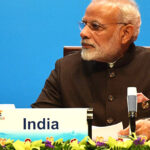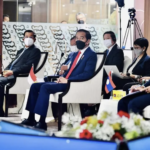
China’s dominance in Southeast Asia is obvious anywhere you look. Long-standing ties and investment in Cambodia earned Beijing the opportunity to act as Prime Minister Hun Sen’s proxy vote in ASEAN during a pivotal year. China’s upstream dams and subsequent hydroelectric power demand compromised livelihoods for Mekong River countries and created leverage over downstream economies. China’s relationships with Thailand and Myanmar complicated efforts to resolve a burgeoning civil war and humanitarian crisis — one that now involves regional powers like Japan, India, and Russia.
The advantages for China – both in terms of infrastructure investments in Southeast Asia and diplomatic ties free from the strings of human rights and democratization – were made largely in the absence of the United States from the region, evidenced by the Obama Administration’s failed “pivot” to Asia and Trump’s failed “America First” foreign policy. The consequences of American foreign policy vacillation and inconsistency, in part, is an emboldened China. The missteps are almost too many to count. For example, the failure to consistently engage with Thailand in the aftermath of the May 2014 coup d’état may have pushed the military regime closer into the arms of China. Equally troubling was President Biden’s diplomatic snub at Thailand at the December “Summit for Democracy.” Many uninvited ASEAN countries, although clearly lacking in democratization, could have benefitted from additional linkages to best practices elsewhere around the globe. These mistakes must be remedied.

Integrating US Allies in Southeast Asia
In order to support democracy and human rights in Southeast Asia, the United States must confront its past, acknowledge its many mistakes, and present a pragmatic yet united front against a more aggressive, authoritarian China. The Great Power rivalry has already begun, despite American missteps. For years, Beijing and Washington have engaged in a long-standing diplomatic row over human rights, with China accusing consecutive American governments of racial discrimination and mass incarceration, while the United States repeatedly alleges human rights violations against Uyghur Muslims in the Xinjiang region of Western China. The latest result is a diplomatic boycott of the 2022 Winter Olympics, joined by Australia and the UK.
The United States needs to remain engaged with states diametrically opposed to American, if not universal, values while impressing upon the importance of those values and the benefits of a sustained American presence in the region. The Biden Summit could have been a prime example of both American engagement with Southeast Asia leaders and an example of how to spread the benefits of democratic values. The reality and the failure of the December summit were that Biden did not have to exclude anyone. While the 2021 version might have been only a start, it could have been held region-by-region, with Quad partners such as Japan, India, or Australia playing a key role in shepherding traditional partners back toward partnerships with the West.
For example, let us not discount Japan’s favorable relationship with Cambodia after the Paris Conference in 1991, its contribution to national reconstruction, as well its current leading role in national development. As of 2019, the accumulated Japanese assistance to Cambodia totaled almost $3 billion. Japan’s efforts in Cambodia have ostensibly offset China’s influence through healthcare, education, infrastructure, and agricultural investments. Similar leading roles could have been constructed for key Indo-Pacific partners — India for Sri Lanka and the Maldives, for example. A regional and/or partner-centered approach to American diplomacy would have done well to quell much of the criticism that Elina Noor mentions above.
Commitment to US Values
American diplomacy must also be matched with action. While I agree with Elina’s position that treating Southeast Asia as a battlefield is fraught with error, America and its allies must match Chinese aggression with action, if necessary. American allies cannot send a competing message that democracies will fail to deliver and are indeed in a state of decline. American partners in the Indo-Pacific have to send a clear signal that democracy is something worth fighting for –not necessarily physically – but in the case of Taiwan and elsewhere, that defending democracy also means defending the hard-won post-war rules-based international order.
The United States must also learn to play the long game. China did not move into Southeast Asia quickly. It did so over time and has traversed difficult relationships, most notably with Vietnam. If Biden, or any future administration, has designs on democracy and a renewed respect for human rights, it must recognize some of the shifts in the region that might spell opportunity down the road. Thailand’s younger generation has proved different from previous generations, chopping slowly away at the social and political taboos that have previously restrained democracy and monarchical reform. While civil society and press freedom in Thailand have been curtailed, it does not mean that they are not vibrant or critical to democratic resurgence. The same can be said for Cambodia, where an entire political opposition lies in hiding or in prison.
ASEAN Support
Democracy and human rights in Southeast Asia must also be seen as a slow and gradual process — a battle measured in small, almost negligible victories or defeats. Championing both must mean a multi-front war, fought in the halls of the United Nations through the Universal Periodic Review (UPR), through its many Treaty Bodies, as well as through ad-hoc coalitions designed to disrupt China’s growing UN influence. It must mean supporting institutions like ASEAN despite its aversion to interference and supporting trade regimes that, over time, could undermine China’s economic dominance. America cannot overcome Chinese dominance in Southeast Asia by itself. It must become more consistent and much more realistic.
This article is part of Divided We Fall’s “Civility Without Borders” series, covering a range of topics fundamental to U.S. foreign policy and a response to Elina Noor of the Asia Society Policy Institute.






